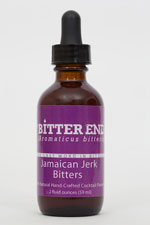
Owners of The Bitter End found that distributors could increase revenue. Article by Sandy Nelson.
Bill York started making his own bitters nine years ago while bartending at a Santa Fe cigar bar, where he learned the alchemy of sophisticated cocktails. His small company, The Bitter End, now manufactures its distinctive handcrafted bitters at a Santa Fe facility and reaches consumers through distributors in New York, California, Chicago and Europe.
“This wasn’t the beginning of the craft cocktail movement,” York said, “but there weren’t that many bitters makers on the market, and when I got the idea for spicy, concentrated bitters, it seemed like a good idea to give it a go.”
York developed his initial five recipes while learning how to navigate the bureaucracy of marketing a food product. New Mexico requires alcoholic beverages to be marketed through a distributor, but mixers — classified as alcohol flavorings — are treated as food products.
“I set up a website to accept sales and started sending out samples to prominent bartenders and influencers,” he said. “We visited a lot of bars and gave out a lot of samples; we tweeted like crazy. We went to Tales of the Cocktail [the world’s largest cocktail trade show, which happens every July in New Orleans] and set up a booth to meet people and sell bottles.”
Like many successful small-scale New Mexico entrepreneurs, York quickly realized he needed help distributing his product beyond the retail and trade-show circuit. “When orders started to come in, we realized that we did not want to fill orders one bottle at a time,” he said, “so I started contacting distributors in every state.”
Because a little bit of bitters goes a long way, York’s product — with names like Jamaican Jerk, Mexican Mole and Memphis Barbeque — orients to professionals and home enthusiasts. “We realized early on that it takes a long time for even the most dedicated home consumer to go through a bottle of bitters. So we had to reach bartenders, and that meant more distribution.”
Some distributors returned his calls or called him on their own. At first, he accommodated their requirements for exclusivity and did not demand sales targets. “Eventually, we picked up distribution in some key markets like New York, California, and Chicago. I reached out to a distributor in Europe and they signed on, too. … The whole thing grew pretty organically.”
Like many small entrepreneurs, York didn’t have a business education or background. He admits to strategic errors and other mistakes. “Every distributor has their own style, and I do my best to accommodate them. I travel and meet bartenders all over the country to hand out cards and samples to encourage them to contact their distributors.”
New Mexico entrepreneurs who want help distributing their product — even exporting it out of state or internationally — can meet the right kind of contacts at trade shows that best match their product’s industry or market category.
There they will learn what distributors want to know before they’re ready to commit, including how much the distributor can hope to make on the product, how many products the business wants help selling and whether the business could increase production if demand intensifies.
Visit The Bitter End bitters at http://www.bitterendbitters.com.
Finance New Mexico article 603 by Sandy Nelson.
